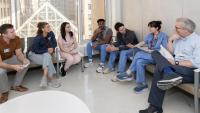Unparalleled Clinical Training

Columbia residents have long prided themselves on clinical autonomy, and we believe that by challenging our residents to think and act independently in a very supportive environment, we give them the greatest opportunities for growth. Clinical supervision is always available and provided in a graded manner, with trainees being given more autonomy as their skills and experience progress.
Laura McLaughlin, Chief Resident
Adding to the opportunity for growth is the high acuity of our hospital. Patients admitted to our inpatient services have complex and advanced pathologies, of both common and unusual diagnoses. In the ICU, our residents take care of some of the sickest patients anywhere with cutting-edge technology, the newest evidence-based medicine, inter-professional team support, and supervision and teaching by award-winning faculty. Our ICUs are among our residents' favorite rotations because taking care of these patients is extremely rewarding and provides fertile ground for a great deal of learning.
Our outpatient experience truly connects us to our diverse, underserved Washington Heights community. We take care of patients for routine health maintenance as well as manage their complex medical conditions. Our primary care faculty are some of our most beloved and role-model exemplary ambulatory care. After three years of training, Columbia graduates are comfortable and proficient in any clinical situation!
General Medicine
The ‘Gen Med’ rotations comprise the core of our inpatient wards experience. Each of our three Gen Med services is composed of four resident teams, pairing either a junior or senior resident with an intern in a one-to-one resident-to-intern ratio. Gen Med has long operated on the two-attending system, whereby sister teams round together, allowing both attendings to provide feedback and guidance on case presentations. Generally, one of the two attendings is a hospitalist, and the other is a specialist drawn from a wide variety of disciplines (pulmonology, rheumatology, nephrology, gastroenterology, infectious disease, and endocrinology).
Each of the three Gen Med services provides broad general medicine exposure and each has its own sub-specialty focus sprinkled in:
Gen Med 1: Stepdown Unit (pulmonary focus though crosses multiple sub-specialties)
Gen Med 2: General Medicine patients + pre-liver transplant patients and gastroenterology focus
Gen Med 3: General Medicine patients + patients with advanced HIV/AIDS and other infectious diseases
Interns spend an average of 12 weeks on Gen Med, and another 12-18 weeks in the subsequent two years of residency.
Cardiology
On the cardiology ward service, residents care for patients with a wide range of diseases including heart failure, valvular disorders, acute myocardial infarction, and dysrhythmias. Resident teams round in the two-attending system, with attendings drawn from many areas within the field—general cardiologists, interventional cardiologists, electrophysiologists, heart failure specialists, and cardiac imaging specialists.
ICU Rotations
Columbia residents rotate through three intensive care units, the Milstein Medical ICU (MICU) and Cardiac Care Unit (CCU), and the Allen ICU (AICU).
The MICU is a twelve-bed unit that cares for the most critically ill and complex patients in the entire hospital system. Four junior residents and four interns work together under the supervision of a critical care attending and fellow. Rounds include nurses, pharmacists, respiratory therapists, and other key members of the care team. Under supervision, interns perform invasive procedures, such as insertion of central venous catheters and arterial lines. House staff become proficient with the management of shock and respiratory failure, managing pressor-dependent and mechanically ventilated patients with acute respiratory distress syndrome (ARDS), septic shock, massive gastrointestinal bleeding, fulminant hepatic failure, and a host of other critical conditions.
The CCU is a fourteen-bed unit, where four junior residents and four interns work together under the supervision of two attending physicians and a cardiology fellow. Residents and interns learn how to manage patients requiring intra-aortic balloon pumps (IABP), pulmonary artery catheters, extracorporeal membrane oxygenation (ECMO), ventricular assist devices (VADs), and other advanced mechanical and medical life-support measures. The on-call CCU resident is also the “code resident,” and is responsible for directing the management of all cardiac arrests that occur on the hospital campus.
The Allen ICU is a twelve-bed unit, where four interns are supervised by three senior residents and a critical care attending. Each day, one of the interns is the “board resident,” admitting new patients and directing rounds on those patients already in the ICU. The AICU offers interns an unprecedented level of responsibility and autonomy caring for critically ill patients. The senior residents on service operate in a fellow-like role, moderating discussions on rounds and advising the interns on management decisions. As a whole, we believe the Allen ICU experience is one of the unique and most-loved educational opportunities in our program.
Oncology
On the solid oncology service, junior residents care for patients with solid-organ tumors and manage medical manifestations of either the tumor or its treatment and related complications, including neutropenic fever, spinal cord compression, malignant effusions, and more.
Outpatient
A critical part of residency training is the outpatient continuity clinic, which allows residents to care for a growing panel of continuity patients over the three years of residency. The ambulatory clinic experience is a rich and unique opportunity to develop a broad set of skills for holistic, long-term care. Residents learn to manage acute and chronic illnesses and to take care of high-risk patients after discharge from the hospital and ED. Over the course of a three-year residency, residents form close bonds with their patients and become part of the community. Residents often comment that one of the hardest parts of finishing residency is saying goodbye to their panel of clinic patients.
Schedule:
Residents have continuity clinic during specified and dedicated outpatient blocks. They have a very small number of additional clinics (for two days during each Elective block and one half-day during each 4-week ICU rotation). There is no clinic on any of the other inpatient rotations. The outpatient blocks contain the ambulatory curriculum embedded within its schedule. Residents assist each other in covering patients through the Walk-In Clinic and an Epic In-basket resident who covers messages from patients for residents on the wards. This block model allows our residents to focus on their work and learning in the hospital while on inpatient rotations, and on ambulatory medicine while on their outpatient blocks.
Clinical Settings and Support:
Most internal medicine residents have their continuity clinic at the Associates in Internal Medicine practice at 168th street, while a small group of residents have clinic at the Washington Heights Family Health Center on 181st Street. Both sites are part of the NYP Ambulatory Care Network, with patients from the surrounding neighborhoods of Washington Heights, Inwood, Harlem, and the Bronx, and are often referred from the hospital. Residents are supported by an interdisciplinary team for patient care: administrators, nurses, social workers, care managers, nutritionists, pharmacists, and community health workers. Centralized resources triage patient calls, refill medications, and assist with prior authorizations. A panel manager assists with scheduling to ensure continuity between patients and residents.
Teaching:
Residents learn from one-on-one teaching from a range of clinician-educators during patient care sessions. Residents have the opportunity to manage acute and chronic illness, learn best practices in preventive medicine, and interact with specialists while caring for their panel of patients. Residents also learn specific skills in dedicated clinic sessions for diabetes management, pre-operative evaluations, hypertension management, walk-in clinic, and hospital/ER follow up. Residents graduate extremely well-prepared to manage complex internal medicine patients.
During outpatient blocks, residents learn in small group didactic sessions on a wide range of outpatient medicine topics. Outpatient report is a daily conference where faculty and residents work together to discuss common topics and integrate evidence-based medicine into clinical practice. Protected half days offer didactic sessions on a range of topics, as well as a longitudinal curriculum in evidence-based medicine and psychosocial medicine. Residents also learn skills in panel management, deliberate practice, and quality improvement. Residents have the opportunity to learn about, explore, and serve during community health experiences in Washington Heights.
Elective & Selective
Elective blocks provide residents with several weeks (2-4 in PGY-1 year, 4-6 in PGY-2 year, and 8-10 in PGY-3 year) to pursue clinical or research opportunities. Residents frequently use this time to write research articles, rotate through subspecialty or non-medicine services, pursue education projects, and much more.
The selective and outpatient elective rotations during intern year allow interns to spend time in the outpatient setting in a field of interest to gain further experience and connect with possible mentors. Current rotation options include palliative care, rheumatology, infectious diseases, benign hematology, oncology, endocrinology, gastroenterology, cardiology, and nephrology.
Allen Wards
The Allen Hospital is a 196-bed community hospital located at the northern tip of Manhattan. Rotating on the Allen wards gives residents an opportunity to experience more “bread and butter” inpatient medicine. One senior resident oversees two interns, which gives the interns more autonomy and allows residents to practice in a more attending-like role.
Nights
The inpatient night float team is responsible for new admissions and cross-coverage of patients under the care of the day teams. Interns and residents are responsible for addressing all acute issues overnight, and therefore gain experience with the workup and management of common clinical scenarios, such as shortness of breath, hypotension, delirium, and more. Residents generally find that the autonomy afforded during this rotation helps them mature into more sophisticated and confident clinicians. The night rotation is structured such that the night interns and residents get to participate in the first part of attending rounds. They present admissions to the day team in the morning and benefit from the discussion and teaching during rounds, and receive feedback on their overnight management decisions.
Teach Rotation
‘Teach’ is a rotation during PGY3 designed to improve teaching skills in various settings and across various platforms, with the objective of preparing senior residents to be outstanding educators, regardless of subspecialty interest. The Teach Resident has the opportunity to lead Medicine Report, Journal club, intern core lectures, and medical student teaching sessions. In addition, Teach residents also participate in developing Learning Lab curricular activities and do hands-on simulation and line training with interns.
Medicine Consult/Preoperative Evaluation
Senior residents spend two weeks on the medicine consult service, performing inpatient consultations and pre-operative evaluations for the hospital’s many non-medicine services. Residents become the hospital’s medicine experts, guiding other physicians through the management of some of their most complicated patients.
ICU Triage
Senior residents spend two weeks as the ICU triage resident, responsible for evaluating all patients potentially requiring admission to the medical ICU or stepdown unit. The ICU triage resident also responds to all rapid response pages and cardiac arrests. In this capacity, residents see the hospital’s sickest patients, provide initial recommendations, assist in stabilizing them, and determine whether transfer to one of the hospital’s ICU beds is warranted.
Senior Medicine
The Senior Medicine rotation is a four-week rotation divided into two-week blocks. The rotation is designed to prepare senior residents for the transition to an attending role while exposing them to the field of Hospitalist Medicine. The focus of teaching is at the senior resident level. The senior resident is primarily responsible for evaluating patients, developing, and advancing their care plans. Residents are given a high degree of autonomy and ownership of their patients.



